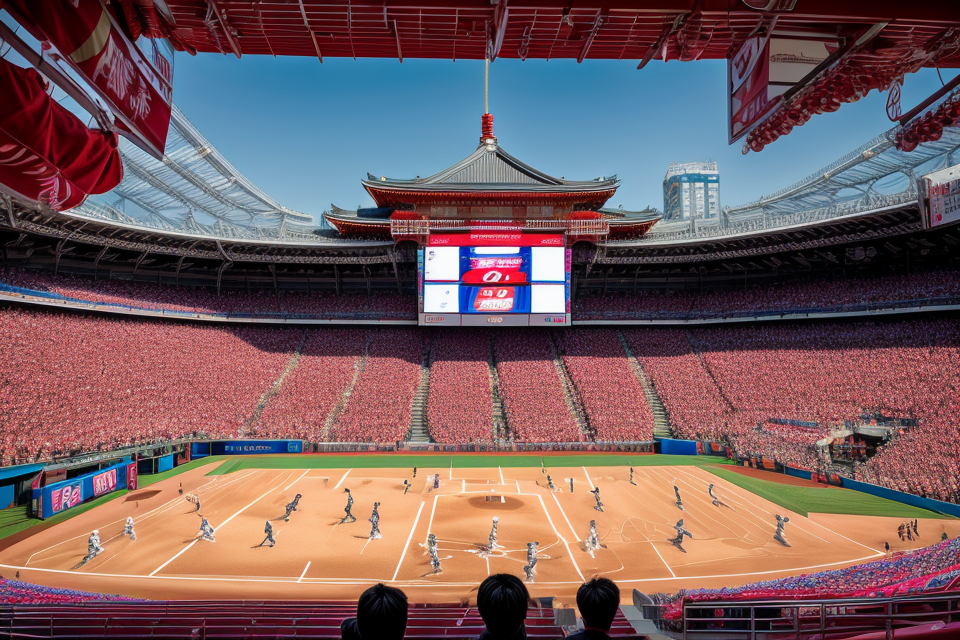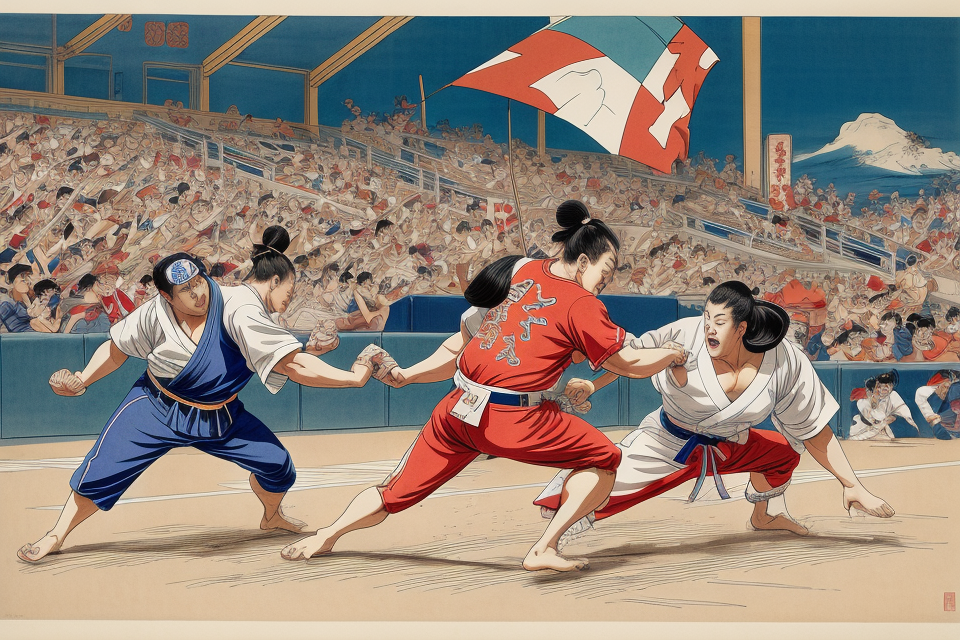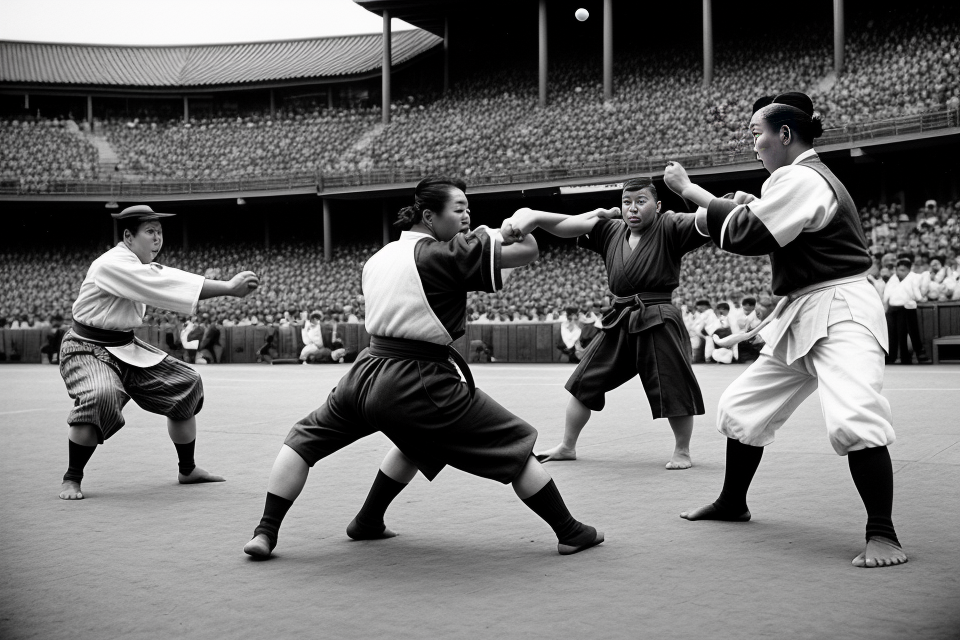Japan is renowned for its rich and vibrant sports culture, which is deeply ingrained in the country’s society. From traditional sports like kendo and sumo wrestling to modern sports like baseball and soccer, Japan has a diverse and dynamic sports scene that captivates the hearts of people of all ages. With world-class facilities, international competitions, and a passionate fan base, Japan is a paradise for sports enthusiasts. In this comprehensive guide, we will explore the many facets of Japan’s sports culture, from its storied history to its cutting-edge technology, and discover why Japan is a global leader in the world of sports. Whether you’re a die-hard fan or simply curious about the country’s sports scene, this guide will provide you with an insider’s perspective on the many wonders of Japan’s sports culture.
Japan’s Sporting Prowess: An Overview
The Origins of Japanese Sports
Ancient Sports and Traditions
Japan has a rich sporting history that dates back to ancient times. Many traditional sports in Japan have been passed down through generations and continue to be practiced today. Some of these sports include:
- Kendo: A martial art that involves the use of bamboo swords, kendo is a popular sport in Japan. It originated as a form of military training and has since evolved into a competitive sport.
- Sumo: Sumo is a wrestling sport that has been practiced in Japan for centuries. It is one of the oldest sports in the country and is deeply rooted in Japanese culture.
- Judo: Developed in Japan in the late 19th century, judo is a martial art and Olympic sport that emphasizes the use of leverage and technique to throw or immobilize an opponent.
- Karate: Karate is a martial art that originated in Okinawa and was later introduced to mainland Japan. It involves the use of hand strikes, kicks, and other techniques to defend oneself.
Modern Sports: Post-WWII Japan
After World War II, Japan experienced a significant economic boom, which led to the development of new sports and the growth of existing ones. This period saw the rise of professional sports leagues, including baseball, soccer, and basketball. Additionally, Japan hosted several international sporting events, such as the 1964 Tokyo Olympics, which helped to further boost the country’s sporting culture.
Japanese Sportsmanship: The Rise of Fair Play and Respect
Japan’s sportsmanship has become renowned worldwide for its emphasis on fair play and respect. The country’s sports culture is deeply rooted in traditional values, which prioritize discipline, humility, and mutual respect. This mindset has fostered an environment where athletes are not only focused on winning but also on conducting themselves with dignity and integrity.
The All Japan Karate-do Federation
One of the most prominent examples of Japan’s dedication to fair play and respect is the All Japan Karate-do Federation. This organization was established in 1955 and is responsible for overseeing and regulating karate competitions and events throughout Japan. The federation emphasizes the importance of respect, discipline, and harmony in the practice of karate, which has led to a unique culture of sportsmanship within the sport.
The Ryōzanpaku Karate Dojo
Another illustration of Japan’s commitment to fair play and respect is the Ryōzanpaku Karate Dojo. Established in 1931 by Gichin Funakoshi, the dojo has been instrumental in promoting the values of traditional karate. Funakoshi was a strong advocate for the importance of respect, humility, and self-discipline in martial arts, and his teachings have influenced generations of karateka in Japan and around the world.
At the Ryōzanpaku Karate Dojo, students are taught to view karate as a journey of self-improvement rather than simply a means to win matches. This philosophy emphasizes the importance of treating opponents with respect and using competition as an opportunity to learn and grow, both physically and mentally.
The All Japan Karate-do Federation and the Ryōzanpaku Karate Dojo are just two examples of the many organizations and institutions in Japan that prioritize fair play and respect in sports. These values have become ingrained in the country’s sports culture, and they serve as a testament to Japan’s dedication to fostering a positive and respectful environment for athletes and fans alike.
Japan’s Sporting Achievements: From the Olympics to the World Cup
Tokyo Olympics: A Rich History
- Japan has a long and storied history with the Olympic Games, dating back to its first participation in 1912.
- Since then, Japanese athletes have consistently excelled in a wide range of sports, including track and field, gymnastics, judo, and wrestling.
- Japan has hosted the Olympics twice: in Tokyo in 1964 and again in 2020, showcasing the country’s commitment to the international sporting community.
Japan’s Football (Soccer) Culture
- Football, or soccer, is one of the most popular sports in Japan, with a rich history dating back to the late 19th century.
- The Japan Football Association was established in 1921, and the national team made its debut in the 1936 Berlin Olympics.
- Despite facing challenges such as a lack of grass fields and cultural differences, Japanese football has grown in popularity and success, with the Japan National Team qualifying for the FIFA World Cup for the first time in 1998.
- Domestic football leagues such as the J.League have also gained international recognition, with clubs like Kashima Antlers and Urawa Red Diamonds competing at the highest levels of Asian football.
Japan’s Sports Landscape: Major Events and Venues
Professional Sports Leagues in Japan
Japan’s professional sports leagues offer a wide range of exciting events throughout the year, showcasing the country’s top athletes and attracting passionate fans from across the nation.
J.League: The Top Football League
The J.League is Japan’s premier football league, featuring 20 teams competing against each other throughout the season. With a strong following of die-hard fans, matches are played at impressive stadiums across the country, providing an electrifying atmosphere for spectators.
B.League: Japan’s Top Basketball League
The B.League is Japan’s premier basketball league, comprising 36 teams from various regions. The league showcases highly skilled players and competitive gameplay, attracting enthusiastic fans who fill arenas to support their favorite teams.
Vissel Kobe: A Unique Football Club
Vissel Kobe is a unique football club in Japan, founded by famous Japanese singer and actor, Goro Inagaki. The club has gained a significant following due to its innovative approach to football, combining talent from both Japan and around the world. Fans of Vissel Kobe are known for their passionate support, creating an unforgettable atmosphere during matches.
Major Sporting Events in Japan
Tokyo Marathon
The Tokyo Marathon is one of the most prestigious marathon events in the world, attracting elite runners from around the globe. The race is held annually in February and covers a distance of 42.195 kilometers, starting and finishing in the heart of Tokyo. The event is known for its energetic atmosphere, with thousands of spectators lining the streets to cheer on the runners.
Kanto Region University Baseball League
The Kanto Region University Baseball League is a highly competitive amateur baseball league that features teams from universities in the Kanto region of Japan. The league is known for its intense rivalries and passionate fan base, with games drawing large crowds to stadiums throughout the region. The league’s top teams regularly compete in the National Collegiate Baseball Championship, making it a key component of the Japanese baseball landscape.
Kanto Cup: A Prestigious High School Baseball Tournament
The Kanto Cup is a highly anticipated high school baseball tournament that takes place in the Kanto region of Japan. The tournament features some of the top high school baseball teams in the country, with games played at various stadiums throughout the region. The event is known for its intense competition and passionate fan base, with many top college and professional baseball players getting their start in the Kanto Cup.
Iconic Sporting Venues in Japan
Japan is home to a wide array of iconic sporting venues that have played host to some of the most memorable moments in sports history. These venues are not only renowned for their architectural prowess but also for the electric atmosphere they create during live events. Here are some of the most iconic sporting venues in Japan:
National Stadium: The Heart of Japanese Sport
The National Stadium, located in Tokyo, is one of the most iconic sporting venues in Japan. Originally built for the 1964 Summer Olympics, the stadium has since been the site of numerous historic moments in Japanese sports. The stadium has a seating capacity of 49,970 and has been the home ground for various professional sports teams, including the Japan national football team.
Nippon Budokan: The House of Karate
The Nippon Budokan, located in Tokyo, is one of the most iconic venues in Japan and is widely regarded as the “House of Karate.” The Budokan was built in 1964 and has since hosted numerous high-profile events, including martial arts tournaments, professional wrestling matches, and concerts. The Budokan has a seating capacity of 14,800 and is widely considered to be one of the most prestigious venues in Japan.
The Future of Sports in Japan: Innovations and Challenges
Sport and Technology: A Dynamic Relationship
Sport and technology have a dynamic relationship in Japan, with innovative advancements shaping the future of sports in the country. Here are some examples of how technology is impacting sports in Japan:
VR Training: Revolutionizing Athletic Performance
Virtual reality (VR) technology is being used to revolutionize athletic performance in Japan. With VR training, athletes can experience simulations of real-life competitions, allowing them to practice and improve their skills in a controlled environment. This technology has been particularly useful for sports such as gymnastics, where safety is a top concern. VR training allows athletes to practice routines and maneuvers without the risk of injury.
Robot Technology: Enhancing Sports and Recovery
Robot technology is also being used to enhance sports and recovery in Japan. Robots are being developed to assist athletes in their training and recovery. For example, robotic exoskeletons are being used to help athletes with physical therapy and rehabilitation. These exoskeletons can provide support and resistance to help athletes regain strength and mobility after an injury. Additionally, robots are being used to provide feedback to athletes during training, helping them to improve their form and technique.
In conclusion, the relationship between sport and technology in Japan is a dynamic one, with innovative advancements shaping the future of sports in the country. From VR training to robot technology, the use of technology is transforming the way athletes train and compete, and it will be interesting to see how this relationship continues to evolve in the future.
Sport and Sustainability: Embracing the Global Movement
Green Stadiums: A New Era for Eco-Friendly Sports
In recent years, Japan has taken significant strides towards sustainability in sports by constructing environmentally friendly stadiums. One example is the Tokyo Dome, which was rebuilt with a solar panel system that can generate up to 10% of its energy requirements. This innovative design has set a new standard for eco-friendly sports facilities in the country. Other stadiums, such as the Toyota Stadium in Aichi Prefecture, have incorporated geothermal heating and cooling systems to reduce energy consumption and promote sustainability. These green stadiums not only demonstrate Japan’s commitment to sustainability but also showcase its advanced technological capabilities in the field of sports infrastructure.
Promoting Sustainable Transportation to Sports Events
As part of its commitment to sustainability, Japan is actively promoting sustainable transportation options to sports events. This includes encouraging the use of public transportation, cycling, and walking to stadiums and other sports venues. Many stadiums have implemented bike-sharing systems, making it convenient for fans to travel to games without relying on private vehicles. In addition, some stadiums offer discounted ticket prices to fans who arrive at the venue using eco-friendly transportation methods, further incentivizing sustainable travel.
To further support sustainable transportation, some cities in Japan have created sports-related cycling routes that connect popular sports venues, making it easier for fans to explore multiple games and events without relying on cars. This not only reduces traffic congestion but also promotes physical activity and healthy lifestyles among sports enthusiasts.
Moreover, the Japanese government has introduced policies aimed at reducing carbon emissions and promoting sustainable transportation. For instance, the “Green Growth Strategy” outlines various measures to reduce carbon emissions and promote sustainable transportation, including the expansion of high-speed rail networks and the development of low-carbon transportation systems.
Overall, Japan’s dedication to sport and sustainability reflects a global movement towards eco-friendly practices in sports. By embracing innovative technologies and promoting sustainable transportation, Japan is setting an example for other countries to follow in their pursuit of a greener future for sports.
Overcoming the Challenges: Strengthening Japan’s Sporting Future
Tackling Ageing Populations and Shrinking Participation
Japan’s ageing population presents a significant challenge to the future of sports in the country. With a rapidly ageing population, the number of people participating in sports is shrinking, which could have serious consequences for the future of the sports industry. To tackle this challenge, the Japanese government has launched several initiatives aimed at encouraging older people to participate in sports. For example, the government has established “senior sports clubs” that offer a range of sports activities specifically designed for older people. Additionally, the government has launched a campaign aimed at promoting sports among the elderly, which includes advertising and educational programs.
Encouraging Women and Girls in Sports
Another significant challenge facing the future of sports in Japan is the underrepresentation of women and girls in sports. Despite the success of Japanese women in sports such as gymnastics and tennis, women’s sports are still not given the same level of attention or support as men’s sports. To address this issue, the Japanese government has launched several initiatives aimed at encouraging women and girls to participate in sports. For example, the government has established “women’s sports centers” that offer a range of sports activities specifically designed for women and girls. Additionally, the government has launched a campaign aimed at promoting women’s sports, which includes advertising and educational programs.
In conclusion, Japan’s vibrant sports culture faces several challenges, including an ageing population and the underrepresentation of women and girls in sports. However, the Japanese government and other stakeholders are taking steps to address these challenges and strengthen the future of sports in Japan. By promoting sports among older people and encouraging women and girls to participate in sports, Japan can ensure that its sports industry continues to thrive and remain a vital part of the country’s cultural landscape.
A Nation United by Sport: The Enduring Passion for Sports in Japan
In Japan, sports are deeply ingrained in the national psyche, and the passion for sports runs deep across the country. The enduring love for sports is rooted in various factors, including the country’s unique culture, the role of sports in social and economic development, and the impact of globalization on the sports landscape.
Japan’s love for sports can be traced back to ancient times, where martial arts and traditional sports like kendo, judo, and sumo were developed as part of the samurai culture. Over time, these sports evolved, and new sports like baseball, soccer, and basketball gained popularity, reflecting the country’s changing social and economic landscape.
Sports have also played a crucial role in Japan’s economic development, with companies like Toyota, Nissan, and Honda investing heavily in sports teams and events to promote their brands and foster goodwill among customers. Additionally, sports events have become an essential part of the country’s tourism industry, attracting millions of visitors each year and boosting local economies.
The impact of globalization on Japan’s sports culture has been significant, with international sports events like the Olympics and the FIFA World Cup showcasing the country’s sports prowess to the world. Japanese athletes have achieved great success in these events, inspiring a new generation of sports enthusiasts and promoting the country’s sporting prowess on the global stage.
In conclusion, Japan’s enduring passion for sports is a reflection of the country’s unique culture, its economic development, and its global influence. The love for sports cuts across all sections of society, uniting people from different backgrounds and ages, and is a testament to the power of sports to bring people together.
The Future of Japan’s Sporting Landscape: A Bright Horizon
As the world continues to evolve, so does Japan’s sporting landscape. With the Tokyo Olympics and Paralympics serving as a catalyst for change, the future of sports in Japan looks bright, with new innovations and challenges on the horizon.
The Emergence of New Sports
One of the most exciting developments in Japan’s sporting future is the emergence of new sports. With a culture that embraces innovation and technology, it’s no surprise that Japan is at the forefront of creating new sports that blend traditional and modern elements. From sports that combine martial arts and parkour to those that incorporate virtual reality, the possibilities are endless.
The Rise of Women’s Sports
Another trend that’s gaining momentum in Japan is the rise of women’s sports. With the success of the Japanese women’s national soccer team at the 2019 World Cup, interest in women’s sports has surged, and the government is taking steps to promote and support women’s sports at all levels. From increased funding for women’s sports programs to the creation of new leagues and tournaments, the future of women’s sports in Japan looks bright.
The Importance of Sustainability
As the world becomes more conscious of the impact of climate change, sustainability is becoming an increasingly important issue in sports. Japan is no exception, and the country is taking steps to make its sporting events more sustainable. From using renewable energy sources to reducing waste and promoting eco-friendly transportation, Japan is leading the way in creating a more sustainable future for sports.
The Challenges of an Aging Population
Despite the bright future of sports in Japan, there are also challenges that need to be addressed. One of the biggest challenges is the country’s aging population. With a growing number of elderly citizens, there is a need for sports that cater to all ages and abilities. From adaptive sports for seniors to sports that promote physical activity and social engagement, Japan is exploring new ways to keep its elderly population active and engaged.
The Power of Technology
Finally, technology is playing an increasingly important role in Japan’s sporting future. From high-tech training facilities to virtual reality simulations, technology is being used to enhance the sporting experience and promote health and wellness. With a culture that embraces innovation and a government that supports technological advancements, Japan is poised to lead the way in the use of technology in sports.
In conclusion, the future of sports in Japan is bright, with new innovations and challenges on the horizon. From the emergence of new sports to the rise of women’s sports and the importance of sustainability, Japan is leading the way in creating a more inclusive, sustainable, and innovative future for sports.
FAQs
1. What types of sports are popular in Japan?
Japan has a rich and diverse sports culture that encompasses a wide range of sports. Some of the most popular sports in Japan include baseball, football (soccer), basketball, volleyball, sumo wrestling, martial arts such as judo and karate, and various traditional sports such as kendo and judo.
2. How can I attend sports events in Japan?
Attending sports events in Japan is a great way to experience the country’s vibrant sports culture. Many sports events, such as baseball and football games, are held at large stadiums in major cities. You can purchase tickets online or at the stadium on the day of the event. It’s always a good idea to check the event schedule in advance and plan your trip accordingly.
3. What are some unique sports events in Japan?
Japan is home to many unique sports events that offer a one-of-a-kind experience. Some of these include the Tokyo Marathon, the Yokohama Red Swarm baseball team’s annual “Japanese Baseball Hall of Fame Induction Ceremony”, and the Sumo Tournament, which is held in Tokyo and Osaka.
4. Can I participate in sports events in Japan?
Yes, there are many opportunities to participate in sports events in Japan. Many cities host annual marathons and other running events, and many hot springs resorts offer opportunities to try traditional Japanese sports such as kendo and judo. You can also take part in recreational activities such as hiking and cycling in the beautiful countryside.
5. What are some must-see sports events in Japan?
Some of the must-see sports events in Japan include the Sumo Tournament, the Tokyo Marathon, and the Japanese Baseball Hall of Fame Induction Ceremony. Other notable events include the Rugby World Cup, which is held every four years, and the FIFA World Cup, which is held every four years.










